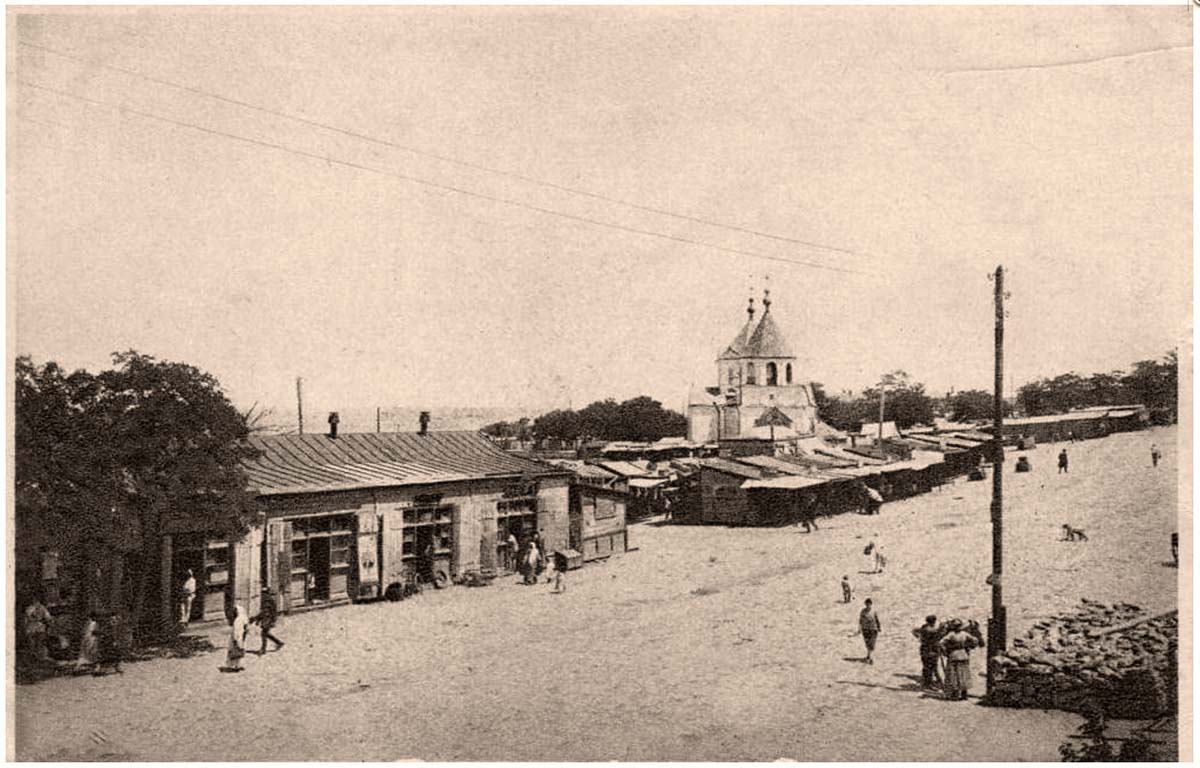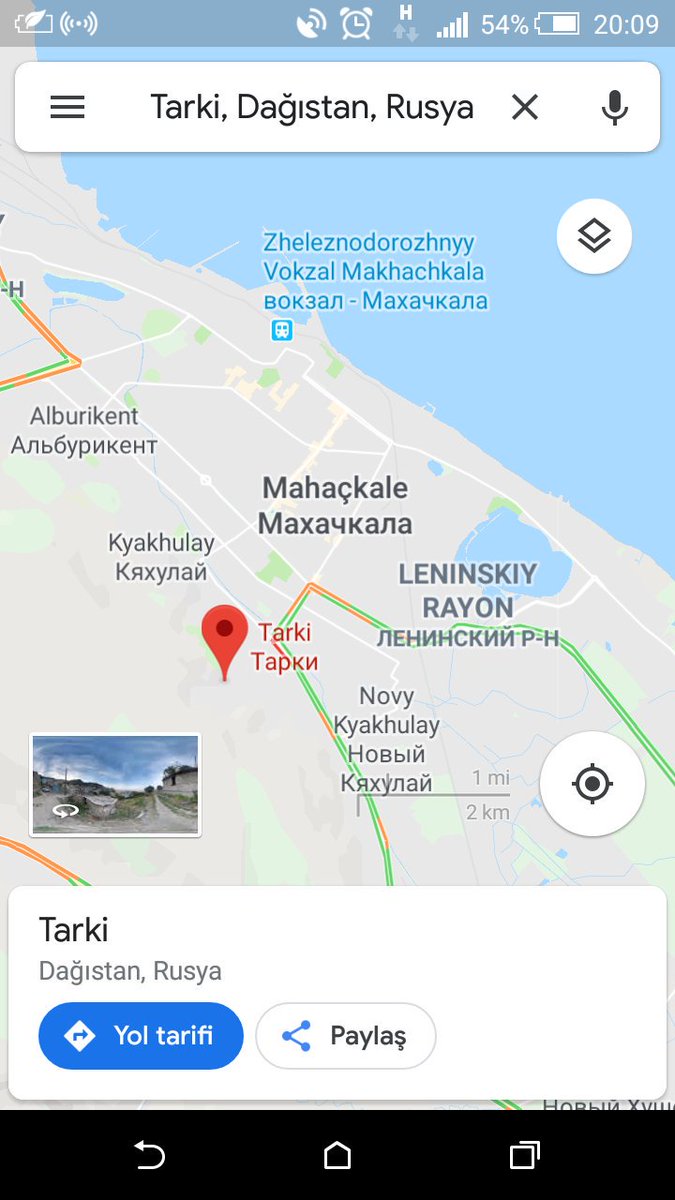as the Mondros Armistice is signed on 30 October 1918,
subjecting the Ottoman Empire to dismemberment. The
gains made in Azerbaijan and Dagestan by the IAC are
essentially voided by the armistice.//
Battle map of the Petrovsk assault. Caspian Sea is
at right, dotted line along the coast in the railway.
The Attack and Seizure of Petrovsk
The 15th Division, which reached a point opposite Petrovsk, occupied
the lines below on 28 October in order to attack the city.
Cavalry company: assigned to surveil the flat land between the coast
and the railway.
and the railway.
Ye107: positioned at Şamahal Hill and east of it. As the regiment
advanced, there was an artillerby dual that continued in various stages
until noon.
Ye38: one battalion and three teams occupied a position overlooking
Çerkes Valley in the north and, along with other elements, remained in
reserve west of this position.
Ye56: moved to the south of Tehyik Solgan Hill in order to be a
reserve for the Division. The cavalry regiment , together with the left
column, advanced to 3 kilometers east of Atlı Boyun.
A local detachment of 600 infantrymen and 300 cavalry commanded
by Colonel Kemal Bey of the North Caucasus Army:
Occupied a line as far as Ostriya Hill (altitude 2241), north of the
Petrovsk-Demirhan Şura road and on the left flank of the cavalry
regiment. The Division fortified the line described above and made
the requisite reconnaissance of the front from where the attack was to
be conducted.
These preparations began on 28 October and were finished on the
evening of 4 November. During this period the Tarki and Şamahal
stations were occupied by our forces and a number of minor raid and
attacks by the enemy were rebuffed.
As the result of reconnaissance efforts, it was decided to change the
main line of attack from Ağaç Agil to the enemy’s hills 1579-2564
in the direction of Tarki Mountain.
The plain from 1579 hill to the sea had been reinforced with barbed wire
and otherwise fortified with 15 cannons so an attack here was quite
difficult. The enemy’s armored trains and 2 warships provided stiff
resistance to our attack.

The Petrovsk bazar.
Based on this situation, the existing forces were deployed as follows:
The 15th Division was assigned to the area two kilometers south of the
Petrovsk-Demirhan Şura road from the Caspian Sea, which runs south
of Petrovsk, and a group under the command of Colonel Akif Bey was
positioned up from the left flank.
Akif Bey’s group was comprised of the 15th Division’s cavalry regiment,
and Kemal Bey’s detachment consisted of local forces made up of 1,000
infantrymen, 300 cavalry, together with Colonel Şükrü Bey’s detachment.
Both groups were under Army command and were to attack after
midnight on 4/5 November in the manner outlined below:
The 15th Division was to occupy the enemy position on the Çerkes Ozen
front with a small force and support the right flank of the main attack.
The bulk of forces were to attack Tarki Mountain, while the majority of
Akif Bey’s infantry were to attack the north slope of Tarki Mountain
from south of the Demirhan Şura road, with a battery company and a
machine gun company. The left flank column, made up of the
remaining forces was to attack the Kafkasda station - ?Terenakutan?
line.

Tarki Mountain, relative to Makhachkale (Petrovsk).
Both groups were to seize the aformentioned lines before 5 o’clock on 5
November and in accordance with this order, the 15th Division made the
following dispositions:
Nuri Bey’s detachment made up of Ye107 T2, T46, K107 machine gun
company and the rapid-fire Krupp mountain team would go to the west
of 1579 hill;
56th Regiment, comprised of T1, T2, K56 machine gun company, Ye107
T1 and a rapid-fire Krupp mountain team, would attack the east side of
2564 hill and the Çerkes Ozen detachment consisting of two companies
from Ye107 T3, 250 militia infantry, 50 horseriders, one field gun and two
mountain cannnon, would occupy the enemy facing them and then
support the attack of the Division’s main force.
38th Regiment would remain at 2006 Tehyik Solgan, in the vicinity of the
Division’s observation locale at midnight on 4/5 November, in order to
be in reserve for the Division.

Petrovsk
The Pitched Battle for Petrovsk
4 November 1918 was a very rainy day. In particular, the newly opened
roads were almost impossible to walk on. The fierce, cold wind that
began in the evening froze the bodies that were wet from the all-day rain.
Eight hours later, it took four hours of forced marching to traverse the
3-4 kilometers from Kaytar Kotan, where the Division HQS was, to the
observation location. Because of fog and darkness, the required
reconnaissance saw nothing until dawn and no news came about the
troops’ operation. Ye38, the ‘kudretli’ battery and the Krupp mountain
team, which the Division needed, were only able to reach the observation
location a bit before dawn on 5 November and they were sent to a spot
in the vicinity of the artillery observation position. Because of the same
difficult marching conditions, the raid that was supposed to occur before
5 o’clock was not made on time. By 6 o’clock the 56th Regiment had
only been able to reach a point 400 meters south of the ordered line.
The 56th Regiment drew closer and at 0620 hours a fierce infantry battle
began. After that both sides began firing their heavy guns and the air
turned gray.
The southern slopes of Tarki Mountain, which was attacked, were
incredibly steep and rocky. Passing through this smokey air, the
infantrymen came to a pass that was suitable for transit. Under the
enemy fire being rained down upon them, our infantrymen climbed
the mountain as if racing against one another, with almost superhuman
strength. The enemy defending this pass fired their machine guns and
threw bombs as if they had gone mad. The battle around the pass was
quite violent and the attacking Ye56 T2 had to stop at the closest point
for a period. The 1st Battalion, advancing on the left of tht 56th
Regiment, seized the summit of Tarki Mountain, altitude 2562, at 0730
hours by means of great self-sacrifice. The 1st Battalion then turned
its machine guns on the pass, which had not yet been taken, from the
side and rained fire on it effectively. Out artillery fire was concentrated
on the pass, as well. Ye56, which was reinforced by Ye38 T3, finally
seized the pass by means of selective attacks at 11 o’clock and scattered
the bewildered enemy. The seizure of the pass yielded booty in the form
of three enemy machine guns, a cannonball and abundant ammunition.
A Russian officer was taken prisoner and said that there had been
1,500 enemy infantrymen defending Tarki Mountain.
Thanks to the 56th Regiment’s flank support and our artillery’s
destructive fire, Nuri Bey’s regiment seized the 1579 altitude hill and
its eastern side with an attack at 1230 hours and subsequently occupied
the entire line. The Division had performed its duty completely.
incredibly steep and rocky. Passing through this smokey air, the
infantrymen came to a pass that was suitable for transit. Under the
enemy fire being rained down upon them, our infantrymen climbed
the mountain as if racing against one another, with almost superhuman
strength. The enemy defending this pass fired their machine guns and
threw bombs as if they had gone mad. The battle around the pass was
quite violent and the attacking Ye56 T2 had to stop at the closest point
for a period. The 1st Battalion, advancing on the left of tht 56th
Regiment, seized the summit of Tarki Mountain, altitude 2562, at 0730
hours by means of great self-sacrifice. The 1st Battalion then turned
its machine guns on the pass, which had not yet been taken, from the
side and rained fire on it effectively. Out artillery fire was concentrated
on the pass, as well. Ye56, which was reinforced by Ye38 T3, finally
seized the pass by means of selective attacks at 11 o’clock and scattered
the bewildered enemy. The seizure of the pass yielded booty in the form
of three enemy machine guns, a cannonball and abundant ammunition.
A Russian officer was taken prisoner and said that there had been
1,500 enemy infantrymen defending Tarki Mountain.
Thanks to the 56th Regiment’s flank support and our artillery’s
destructive fire, Nuri Bey’s regiment seized the 1579 altitude hill and
its eastern side with an attack at 1230 hours and subsequently occupied
the entire line. The Division had performed its duty completely.
At noon the Çerkes Ozen detachment attacked but was
unable to advance because of the enemy’s superiority.
unable to advance because of the enemy’s superiority.
//End Part IX//


Hiç yorum yok:
Yorum Gönder